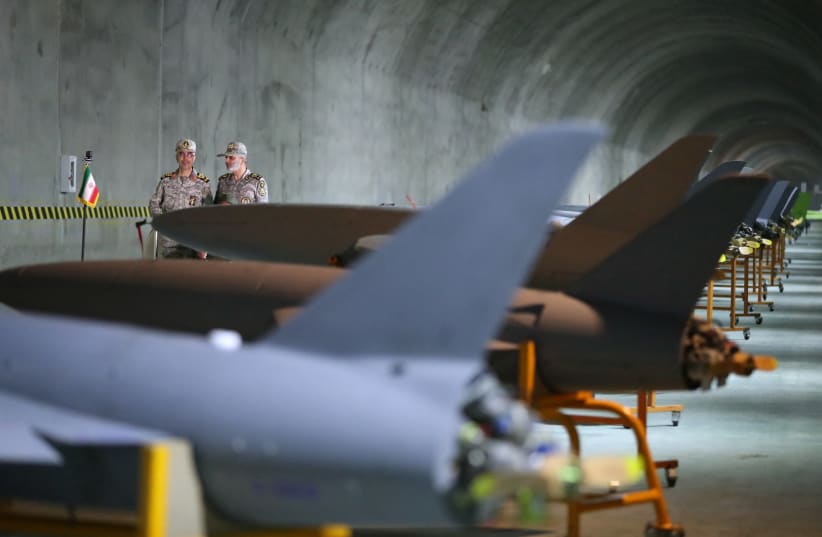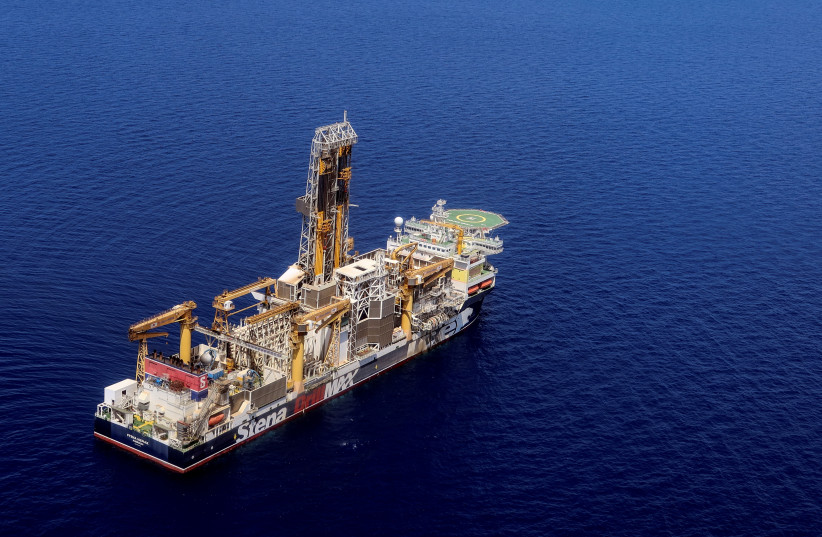The drones that Hezbollah launched toward the Karish gas rig last week were Iranian unmanned aerial vehicles (UAVs), Defense Minister Benny Gantz confirmed.
“Hezbollah used UAVs made in Iran in their operation against the Karish,” he said in a briefing to military reporters. “It should be said that Hezbollah carries out missions for Iran, and its weapons are weapons made in Iran whether it is manufactured there or the knowledge acquired by them.”
The IDF shot down three UAVs launched on Saturday by Hezbollah toward the Karish rig, which is situated within Israel’s economic waters but disputed by Lebanon.
One of the three UAVs was shot down by an F-16, and the other two were downed by the naval Barak 1 Medium-Range Surface-to-Air Missile system on the INS Eilat, marking the first time the system was used against aerial threats.
The military also confirmed that another drone launched by the Lebanese terror group was downed June 29. The drone was intercepted “at a great distance from the maritime border” within Lebanon’s exclusive economic zone.
Speaking at the graduation ceremony of the IDF officers course, Gantz said that it was Lebanon which is responsible for stopping Iranian aggression carried out by Hezbollah from its territory.
“The State of Israel knows how to protect its assets well, and Hezbollah must understand that the mission it is carrying out on behalf of Iran could become a deadly mission that will first and foremost harm the interests of Lebanese citizens,” he said.
According to the ALMA Research Center, Hezbollah has about 2,000 unmanned aerial vehicles, many of them advanced UAVs from Iran and others manufactured independently by the group.
The Israel Air Force has admitted that identifying and intercepting hostile drones is challenging, and considers drones to be one of the top five threats facing the country. The defense establishment is also concerned about the damage to the IAF’s aerial superiority over Lebanon due to Hezbollah’s long-range missiles and air defense systems.
The Lebanese response
Lebanon slammed Hezbollah for the launching of the drones, which was done without the government’s consent.Prime Minister Najib Mikati and Foreign Minister Abdallah Bou Habib issued a joint statement on Monday stating that Hezbollah’s launch of the drones “is unacceptable and endangers the country for no reason.”
Hezbollah’s Secretary-General Hassan Nasrallah has threatened to use force to prevent the Karish gas rig from producing natural gas, which is expected to start in several weeks.
Israel sees the rig as a strategic asset several kilometers south of the area over which negotiations are being conducted, and has warned that it will defend it.
In addition to being officially at war, Lebanon and Israel have an unresolved maritime border dispute over a triangular area of sea of around 860 sq. km., It extends along several blocks for exploratory offshore drilling for which Lebanon has put in a tender.
US energy envoy Amos Hochstein is expected to join US President Joe Biden on his visit to Israel and Saudi Arabia next week, and will hold meetings regarding the dispute.
On Wednesday Lebanon’s President Michel Aoun said that negotiations regarding the maritime border demarcations between Lebanon and Israel would be “finalized soon” with a “solution that would satisfy everyone.”
“Border demarcation is making progress and we will soon finalize it”
Michel Aoun
“Border demarcation is making progress and we will soon finalize it,” Aoun was quoted as saying in an interview by Lebanon’s Naharnet news site.
“Border demarcation is making progress, and we will soon finalize it. I believe finalizing it will not take a long time,” and that the agreement “will definitely be in everyone’s interest. We are demarcating a border, and the two parties must be satisfied with the solution when we reach it, or else it wouldn’t be a solution, but rather hegemony by one party over the other.”

